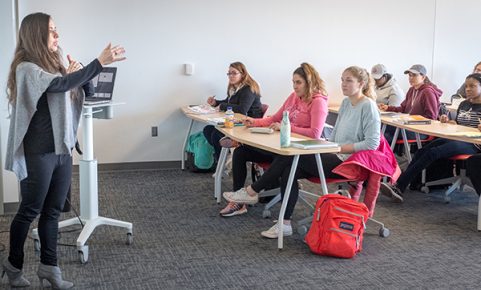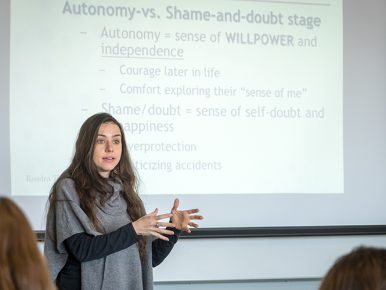Educational psychologist makes global impact with “Just World” research


INDIANAPOLIS – When a child gets into trouble at school, a number of factors could be at play. For educational psychologist Kendra Thomas, a student’s perception of fairness is a factor that could be the key to understanding some adolescent behavior.
Thomas, assistant professor of psychology, focuses on social psychology theories such as Just World belief and systems justification theory. Her research, conducted in Brazil, Kenya and the United States, involves adolescents and how their beliefs about fairness can shape their worldview and school experience.
The data from her research can have several applications, from school discipline policies and cultural differences to understanding how different communities perceive the role of law enforcement.
“If I anticipate a level of fairness, I might be more motivated to work hard, but I also might be more motivated to blame the victim because I assume they must’ve received what they deserved,” Thomas explained.
Systems justification theory supports the idea that people tend to justify the systems they’re living in, and the more people are encompassed in the system, the more they might feel the need to justify it.
“I’m really interested with people’s interpretation of fairness and how that interpretation could drive their behavior,” said Thomas, who recently published research in Social Justice Research and Psychological Reports.
Thomas’ current research involves middle school students, their assumptions about fairness and their well-being. Her goal is not about determining if those rules are fair, but rather how students’ perceptions of fairness affects their behavior and well-being.
“The student who says that the rules aren’t fair is also more likely to report disrespecting the teacher, or to report being bullied or to say they don’t do their homework. Those are the kinds of relationships I look for in the data,” Thomas explained.
Her findings can help educators and parents address behavioral problems and provide a window into how students’ worldviews are being shaped through the context they grow up in.
“We could sit down with a group of teachers and parents and say, ‘I know that you think the rules are fair, but the student does not. So how do we communicate it so that not only is it fair but the student feels heard? That perception is going to influence their lived experience and what rules they choose to buy into and what rules they reject out of rebellion,” Thomas said.
Learn more about UIndy’s psychology programs here.
During research conducted in Brazil and Kenya, Thomas found that students who perceive their school and community as fair also were more likely to buy into the school rules.
The University’s psychology program offers undergraduate students a research practicum featuring one-on-one sessions with faculty throughout the semester. Thomas has worked with several students on this basis, including Karli LaGrotte ’18, who presented her research, “Belief in a Just World Among Brazilian Adolescents: Differences Across Age, Race and Religion,” during Scholar’s Day in April 2017.
Courtney Shepherd ’18 also worked with Thomas on undergraduate research. Shepherd plans to pursue a master’s degree in gerontology and to work with the elderly population.
“Dr. Thomas taught me each step of the research process and allowed me to be actively involved in data processing. She provided me with constructive criticism so I could be better in the research process,” said Shepherd.
Thomas has also advised graduate and doctoral students, including Erin Hoolihan ’20 (PsyD, clinical psychology). Hoolihan’s dissertation investigates the potential socioeconomic and racial differences that exist in the connection between perceptions of justice, social capital and well-being.
“Dr. Thomas has always made my research a priority, and it is a wonderful experience to have an advisor who cares as much about my research as I do,” Hoolihan said.
Written by Sara Galer, Senior Communications Specialist, University of Indianapolis. Contact newsdesk@uindy.edu with your campus news.

